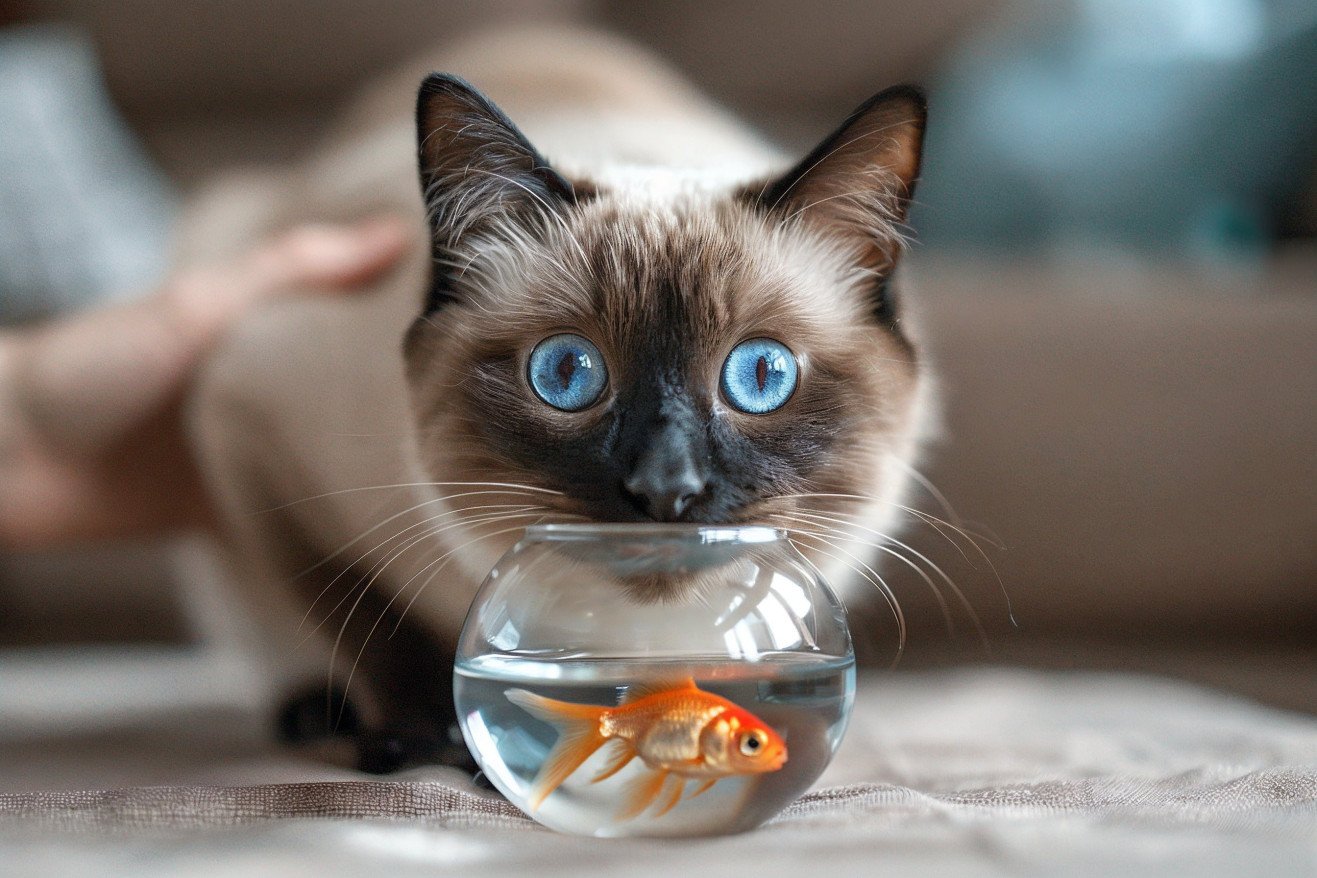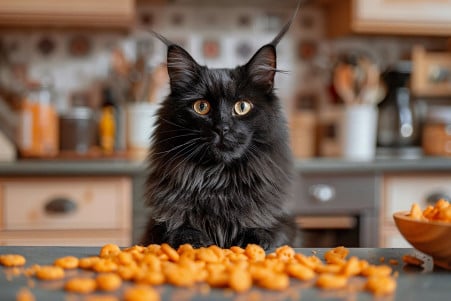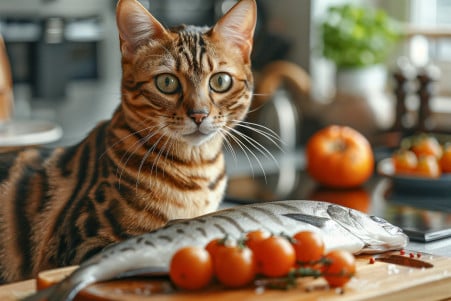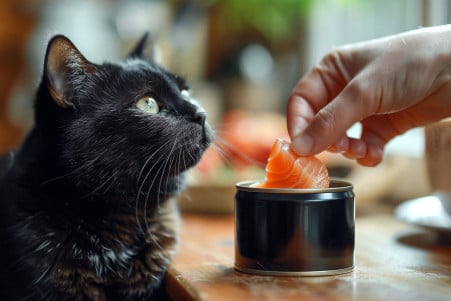Can Cats Eat Goldfish? A Look at Risks and Safer Alternatives
5 June 2024 • Updated 3 June 2024

If you’re a cat owner who has ever seen your pet eyeing the goldfish in your home aquarium, you may have wondered if it’s OK for cats to eat goldfish. While the occasional goldfish snack is probably safe for adult cats, it’s not recommended that cats eat goldfish regularly because the bones can cause digestive issues and physical injuries, and the thiaminase enzyme in fish can lead to nutritional deficiencies over time.
In this article, we’ll take a deep dive into the nutritional science and expert advice to help you better understand this strange dietary question. We’ll explore why goldfish aren’t the best option for a cat snack, the potential dangers of cats eating goldfish, and some alternative treats that are safer for your cat. By the end, you’ll know whether or not it’s a good idea to let your cat enjoy the occasional fishy snack without risking their well-being.
Can cats eat goldfish?
Dangers of Feeding Goldfish to Cats
There are several dangers associated with feeding goldfish to cats that pet parents should be aware of. One of the biggest is the bones, which Hepper notes can cause choking hazards, intestinal impactions, punctures, and ruptures if swallowed. Goldfish can also contain dangerous parasites, bacteria, and fungi that could cause illness in cats if they are ingested, especially since they are often kept in dirty tank conditions that are full of waste.
The chemicals that are used to treat aquarium water are another concern since they can be toxic to cats if they are ingested when a cat eats a goldfish. In addition, regularly eating raw fish can lead to a thiamine (vitamin B1) deficiency in cats, which can cause neurological problems like seizures as a result of the deficiency. In general, goldfish don’t contain the nutrients that cats need, so they should never be part of a cat’s regular diet.
While feeding a cat an occasional goldfish treat is unlikely to cause serious harm to an adult cat, the dangers of feeding them to cats on a regular basis are serious enough that pet parents should avoid doing so. That said, we can take a look at some of the potential health benefits that the right kinds of fish can have for cats when they are fed in moderation.
Nutritional Value and Benefits of Fish for Cats
While goldfish are not recommended for cats, fish can be a good source of nutrition for cats when given in moderation. Fish is a great source of protein and omega-3 fatty acids such as DHA, which per Hill's Pet is important for brain development and neurological health, especially in kittens. The omega-3 and omega-6 fatty acids found in fish can also be beneficial when included in a cat's diet.
That said, Bella & Duke points out that raw fish doesn't contain many of the other nutrients that cats need to maintain a healthy diet. As a result, fish should be used as an occasional treat for cats and not as a staple in their diet. Fish can be a fun treat for cats when given in moderation and with the right precautions, but it should not be used as a cat's sole source of nutrition.
What to Do If Your Cat Eats a Goldfish
If your cat eats a goldfish, try to stay calm and watch for any symptoms of concern. Per JustAnswer, make sure to call your vet right away, especially if your cat seems to be in pain or is showing any other signs of being unwell. Be sure to tell the vet exactly what your cat ate and when so they can determine if your cat needs to be treated.
Unless your vet or a pet poison hotline tells you to, do not try to make your cat throw up. Per wikiHow, some poisons can cause more damage if they're thrown up. Most cats will be fine after eating one goldfish if they get help right away, but make sure to keep an eye on them as per Agriculture Victoria's recommendations.
How to Keep Cats Away From Fish Tanks
If you own both a cat and a fish, there are a number of ways to keep your fish safe from your cat. Per wikiHow Fitness, the first step is to place your fish tanks or bowls in areas that are out of reach from your cat, like high cabinets or rooms with doors that can be closed. You can also use secure lids or covers to keep your cat from being able to reach into the tank.
Lemonade Insurance also suggests using environmental deterrents like aluminum foil, double-sided tape, or scent repellents around the area where your fish tank is located. You can also make sure your cat has plenty of water and entertainment to keep them from being interested in the fish tank. Finally, if all else fails, Catster recommends finding a new home for your cat or your fish if you can't get your cat to leave your fish alone.
These measures can help you make sure that your cat and your fish stay safe. However, there are also other health concerns to keep in mind when it comes to feeding fish to cats.
Other Risks of Feeding Fish to Cats
Fish is often high in mercury, PCBs, dioxins, and other toxins that can build up in cats over time. Holistic Vet Blend notes that these toxins can lead to neurological problems, hyperthyroidism, and kidney disease in cats.
Some fish, like octopus and pufferfish, are toxic to cats and should never be given to them, according to Catster. In addition, fish-based pet foods can contain fish by-products that are low in quality and high in phosphorus, magnesium, and histamines. The Cat Whisperer says that these can lead to urinary problems, food allergies, and other health issues in cats.
While the occasional treat of high-quality fish may offer some health benefits, the risks of feeding fish to cats on a regular basis are real. Pet parents need to be careful to avoid the potential toxins and other problematic ingredients found in many fish and fish-based products.
Conclusion: Finding a Healthy Middle Ground
While the occasional goldfish snack is unlikely to cause serious harm to an adult cat, it's not something that should be part of their regular diet. Goldfish and other raw fish come with risks like bone issues, thiamine deficiency, and the potential for toxins and bacteria. On the other hand, cooked fish like salmon or sardines can offer some nutritional value if they're given to cats in moderation.
The bottom line is that it's important to be aware of the risks and to take steps to make sure cats don't eat too much fish or have access to aquarium fish. With the right precautions and a healthy, species-appropriate diet, cats can be healthy and happy without snacking on the family's goldfish.


